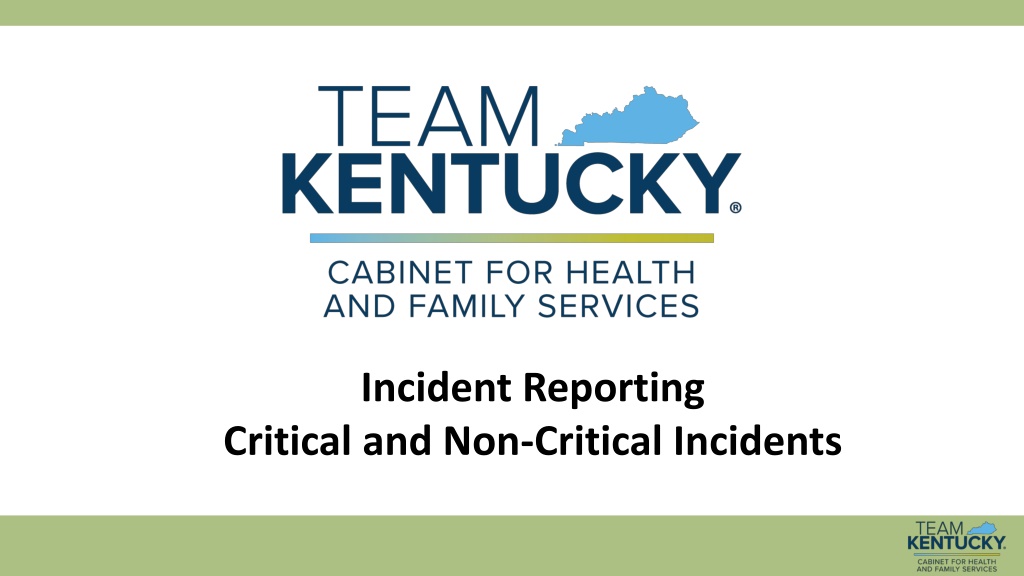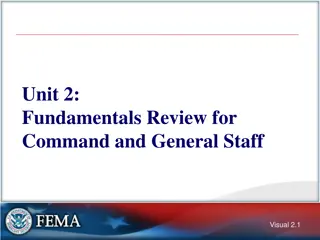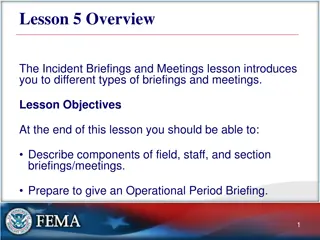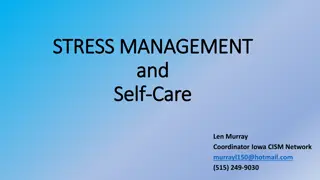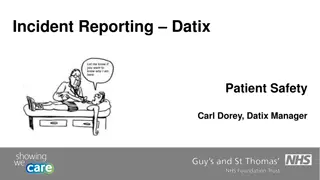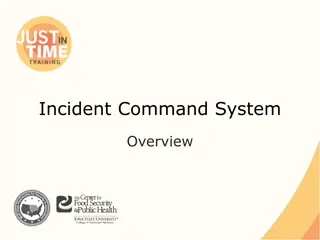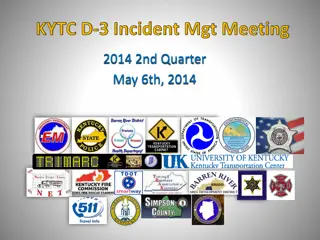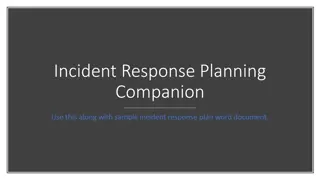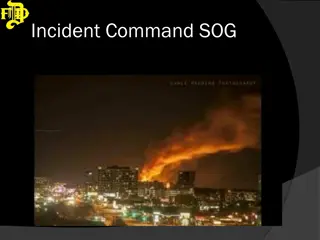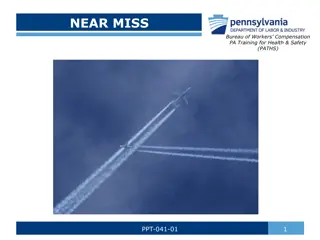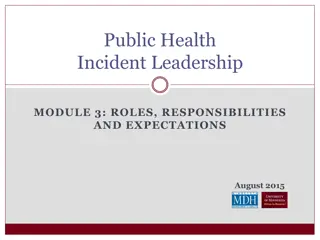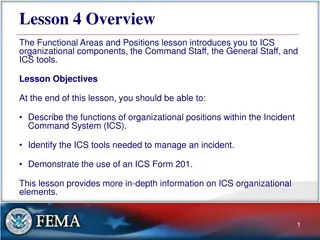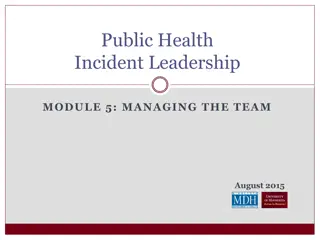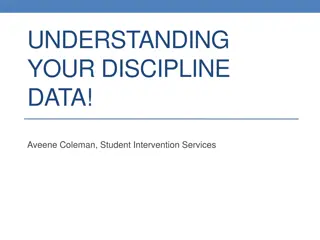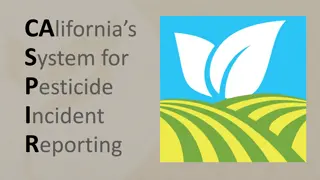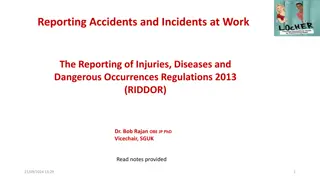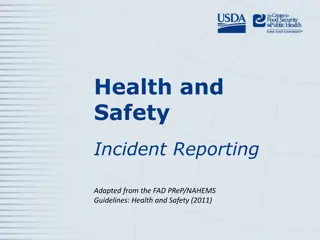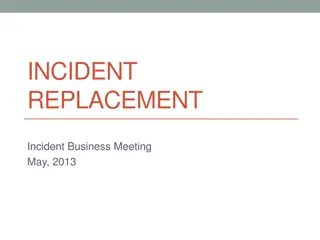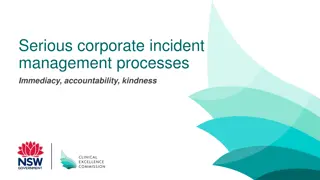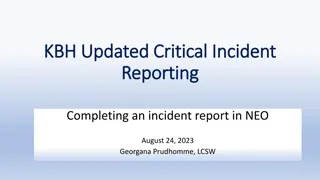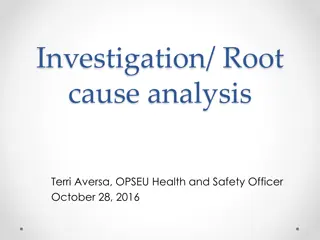Understanding Critical and Non-Critical Incidents in Incident Reporting
Critical incidents, as defined by regulations, are serious events that pose immediate risk to health, safety, or welfare. Non-critical incidents, on the other hand, are minor in nature and do not have serious consequences. Incident reports play a crucial role in documenting occurrences, identifying system issues, reducing risks, and promoting a culture of learning and improvement.
Download Presentation

Please find below an Image/Link to download the presentation.
The content on the website is provided AS IS for your information and personal use only. It may not be sold, licensed, or shared on other websites without obtaining consent from the author. Download presentation by click this link. If you encounter any issues during the download, it is possible that the publisher has removed the file from their server.
E N D
Presentation Transcript
Incident Reporting Critical and Non-Critical Incidents
What is a Critical Incident? What is a Critical Incident? The Incident Reporting and Instructional Guide for 1915(c) HCBS Waiver states: Critical incidents are serious in nature and pose immediate risk to health, safety, or welfare of the waiver participant or others. 2
What is a Critical Incident? What is a Critical Incident? Regulations for 5 of the waivers (all but HCB) define a critical incident as: A critical incident shall be an alleged, suspected, or actual occurrence of an incident that: (a) Can reasonably be expected to result in harm to a participant; and (b) Shall include: 1. Abuse, neglect, or exploitation; 2. A serious medication error; 3. Death; 4. A homicidal or suicidal ideation; 5. A missing person; or 6. Other action or event that the provider determines may result in harm to the participant. 3
What is a Critical Incident? What is a Critical Incident? The wording in the HCB regulations is slightly different than the others: (a) An event that potentially or actually impacts the health, safety, or welfare of the participant shall be a critical incident. (b) A critical incident may include: 1. Death; 2. Alleged or suspected abuse, neglect, or exploitation; 3. Homicidal or suicidal ideation; 4. Missing person; 5. A medication error resulting in consultation or intervention of a licensed medical professional; 6. An event involving police or emergency response personnel intervention; or 7. Other action or event that may result in harm to the participant. 4
What is a Non What is a Non- -Critical Incident? Critical Incident? Instructional Guide Non-critical incidents are minor in nature and do not create a serious consequence or risk. Incidents that do not meet the criteria for critical incidents should be reported as non- critical incidents. Regulation * An incident shall be any occurrence that impacts the health, safety, welfare, or lifestyle choice of a participant and includes: A minor injury. A medication error without a serious outcome. A behavior or situation that is not a critical incident. *Note: the wording is in all but the HCB waiver regulations. The HCB waiver only refers to critical incidents 5
Why are Incident Reports important? Why are Incident Reports important? To document the exact details of the occurrence while it is fresh in the minds of who witnessed the event. Identifies system(s) issues to help improve quality of services and safety. Reduces the risk of reoccurrence. Provides a chance to learn from your own mistakes. Improves staff engagement to help create a culture of trust and transparency among staff, rather than just following protocols. Positive impact on a provider s reputation. 6
Patterns May Escalate Non Patterns May Escalate Non- -Critical to Critical Critical to Critical MWMA will automatically classify some otherwise Non-Critical Incidents as Critical based on previously reported Non-Critical Incidents. For example, if a participant has three or more events of self-injurious behavior in a 90 day period, MWMA will automatically categorize the third (and subsequent) events as Critical even if no medical treatment was required. (This occurs for incidents over all service sites for a participant). 7
Not Everything is an Incident Not Everything is an Incident DMS provided the following guidance in the Instructional Guide: Events that do not have the potential to impact waiver participants health, safety, or welfare do NOT need to be reported. Examples include but are not limited to: Scheduled medical procedures/surgeries. Request to change a case manager or request for services to be placed on hold. Peer to peer interactions that show no observed threat to health, safety, or welfare (e.g. argument over who sits in what chair) 8
Judgement is necessary Judgement is necessary The Instructional Guide included these examples: Lifestyle choices or actions that show no observed impact on health, safety, or welfare (e.g. having a few alcoholic drinks as long as it is not contra-indicated) Flu and STDs. Medical providers report flu, sexually transmitted diseases, and other illnesses to local health departments or the Kentucky Department for Public Health in accordance with Kentucky Administrative Regulations (902 KAR 2:020). If the waiver participant is diagnosed with an STD and there is suspected abuse or neglect, this should be reported under the incident type Suspected abuse or neglect. The guide cannot account for every situation/scenario. It is also important to consider if the level of supervision was met and/or if the waiver participant is adjudicated/is able to provide consent to sexual activity, is of drinking age, etc. Take these things into account when determining if something is an incident. 9
When in doubt, fill it out When in doubt, fill it out An incident shall be any occurrence that impacts the health, safety, welfare, or lifestyle choice of a participant. If you think something fits that definition, but are not sure, report it. It is better to over-report than under-report. 10
Notifications ~ Critical Incidents Notifications ~ Critical Incidents Case Manager (always) Guardian (if applicable) DCBS (alleged abuse, neglect, or exploitation) As soon as possible but no later than eight (8) hours. Document notification in the body of the report in MWMA Within the same day if witnessed/discovered within business hours (8-4:30 ET M-F excluding holidays); OR the next day if outside of business hours Operating Agency (DDID, DMS, or DAIL) via MWMA 11
Notifications ~ Non Notifications ~ Non- -Critical Incidents Critical Incidents Case Manager (always) Guardian (if applicable) Within 24 hours of witnessing or discovering the incident Within 24 hours; If the incident occurs (is witnessed or discovered) on a weekend or state holiday, report the following business day. Operating Agency (DDID, DMS, or DAIL) via MWMA 12
Helpful Hints on notifications: Helpful Hints on notifications: Always consider the date the incident was discovered as the reporting date. (For example, if you receive a call on 4/12/2023 of an allegation of abuse that occurred on 4/1/2023, you would document your date of discovery as 4/12/2023, not 4/1/2023). oDoing so will prevent your notifications from appearing late in the documentation. oIf you aware that the notifications are late when completing the incident report, please document why in narrative. You can address further interventions in your RMIR. (i.e.- MWMA was down for maintenance). 13
Helpful Hints with Categorization: Helpful Hints with Categorization: Utilization of the Incident Management Sub-Category Questions Logic document in TRIS is highly recommended when attempting to determine what category an incident falls under in MWMA. Incidents often found not classified correctly in MWMA: oBehavioral episodes that result in damage to home and/or police involvement. In these circumstances, this should be considered a major event, which would categorize this as a critical incident. Considering this a minor event would categorize the incident as non-critical. oConsider criteria for abuse under KRS 209 when looking to categorize peer to peer aggression or certain behavioral events. The incident may meet the criteria for Suspected Abuse. o*Also remember to include an incident report for the peer as well. 15
Definitions in KRS 209 of Abuse, Neglect, Definitions in KRS 209 of Abuse, Neglect, and/or Exploitation: and/or Exploitation: Abuse is defined as infliction of injury, sexual abuse, unreasonable confinement, intimidation, or punishment that results in physical pain or injury, including mental injury. Exploitation means obtaining or using another person s resources, including but not limited to funds, assets, or property, by deception, intimidation, or similar means, with the intent to deprive the person of those resources o Deception is defined as: (a) Creating or reinforcing a false impression, including a false impression as to a law, failure, intention, or other state of mind. (b) Preventing another from acquiring information that would affect his or her judgment of a transaction. (c) Failing to correct a false impression that the deceiver previously created or reinforced, or that the deceiver know to be influencing another to whom the person stands in fiduciary or confidential relationship. 16
Definitions in KRS 209: Abuse, Neglect, and/or Definitions in KRS 209: Abuse, Neglect, and/or Exploitation Exploitation (continued): Neglect is defined as: oA situation in which an adult is unable to perform or obtain for himself or herself the goods or services that are necessary to maintain his or her health or welfare, or the deprivation of services by a caretaker that are necessary to maintain the health and welfare of an adult. oNeglect can be intentional or unintentional. 17
Possible Scenarios of A/N/E: Possible Scenarios of A/N/E: Staff not following the individual s level of supervision. (i.e.-the individual is supposed to have within arm s reach supervision and staff were noted to be outside of the home while the individual was inside on the couch during a home visit). Not following safety measures/protocols in place pursuant to the participant s Person-Centered Service Plan (PCSP). (i.e.- safety helmet not in place, requires a Hoyer lift but not in the home) Staff not following the correct diet order or modification. (i.e.- staff was observed preparing a meal of chicken tenders and fries and the individual is prescribed a pureed diet). Injury of unknown origin. (if someone sustains an injury that cannot reasonably be explained). An individual tests positive for a medication in their system for which they are not prescribed. Medication errors that resulted in medical intervention and/or went undiscovered for an extended time. Consider categorizing under Suspected Neglect and choosing Medication Error as a subcategory. 19
Possible Scenarios of A/N/E Possible Scenarios of A/N/E (continued continued): The choices of the individual not being honored. (i.e.- Choice in providers, choice in housemates, or choice in homes). Consider categorizing as abuse, neglect, and/or exploitation. Missed medical appointments. Weight loss (not necessarily if it is medically explained, but may consider access to food and/or living conditions). **Remember if you are including a category for abuse, neglect, and/or exploitation, notification of DCBS is required. 20
Helpful Hints with Categorization Helpful Hints with Categorization oPublic Health Concern: Used to categorize incidents where a person has an infectious disease or condition that has the potential to spread to others. (Tuberculosis, bed bugs, lice) 21
Who has the responsibility to report? Who has the responsibility to report? Instructional guide advises the following: Direct Service Provider have the responsibility to report: All incidents that occur at the direct service providers location. All incidents where the direct service provider is the first person to witness or discover the incident, regardless of location. Case Manager or support broker have the responsibility to report: The case manager or support broker is responsible for reporting incidents if the case manager or support broker is the first person to witness or discover an incident AND the incident does not occur at a direct service providers location. 22
Who has the responsibility to report? Who has the responsibility to report? (cont d) Things to consider: We ask for additional incident reports from all providers involved for the following situations: o If a case manager (CM) discovers an issue at a service provider site. We ask for incidents from the CM and the direct service provider. o If an individual makes allegations at one service provider against their staff from another service provider. (i.e.- The individual arrives at day training and makes allegations towards their residential staff.) Rationale: o To ensure ALL service providers involved have a voice in what occurred. (i.e.- If a CM completes a home visit and finds various maintenance and sanitary issues. The CM has documentation of their findings, and the residential provider will have documentation of theirs. Their opinions on the findings may differ.) To ensure there is documentation from the responsible service provider of how they addressed the issue. ( i.e.- If an individual arrives at the day program and makes allegations of abuse against the residential staff, the day training s report will have a first-hand account of what was reported. The residential providers report will have the results of their internal investigation into the matter which MAY include personnel actions and policy changes that the day training provider would not be privileged to and could share in their RMIR). o 23
Scenario #1: Scenario #1: Billy attends a day training five (5) days a week with Sunny Skies. Billy resides in a staffed residence with A Summer Breeze. On 4/17/2023, Billy informed his preferred staff at his day training he was feeling under the weather and wanted to go home. As a precaution, staff took his temperature, and it was 98.6 degrees. Billy s staff contacted the residential supervisor at A Summer Breeze and the residential supervisor made arrangements for staff to pick Billy up and take him to home to rest. During the car ride home with his residential staff, Billy expressed he wanted to go to get checked out at the local hospital. Billy was admitted to the hospital with pneumonia. Who has the responsibility to complete the incident report in MWMA for Billy s hospital admission? 24
Answer Choices: Answer Choices: A. Residential provider B. Day training provider C. Both 25
Scenario #2: Scenario #2: Sally attends a day training four (4) days a week at Sunny Skies and resides with a Family Home Provider (FHP) at A Summer Breeze. Sally complained of chest pains to her day training staff around 2:15 p.m. on 4/17/2023. Her day training staff called 911. Sally was rushed to the hospital, where she was admitted overnight for monitoring. Around 6 p.m. that evening, Sally reported to the hospital staff, she was fearful of returning to her FHP because she feared her FHP would hit her again. The hospital reported these concerns to DCBS, the hospital social worker, and by phone to the Executive Director (ED) of the residential agency. Who has the responsibility to report the hospitalization and the allegation of abuse? 26
Answer Choices: Answer Choices: A.Only the day training provider because that is where Sally complained of chest pains. B.The residential provider because the ER visit/hospital admission extended past the day training s normal business hours. C.Both the residential provider and day training providers. The day training provider completes an incident for the ER visit/hospital admission. The residential provider completes an incident for allegations of abuse. 27
Contact information: Contact information: Regional Nurses: Kaliesa Hunt- Northern Kentucky/Lexington region (includes Frankfort, Morehead, Ashland, and Richmond). Kaliesa.hunt@ky.gov Monica Duncil- Southeastern KY (includes Somerset, London, Pikeville, and Hazard). Monica.duncil@ky.gov Tami Lewis- West (includes Paducah, Hopkinsville, Bowling Green, and Owensboro). Tamil.lewis@ky.gov Pam Yazell- Louisville (Louisville and surrounding areas to include Elizabethtown, Bardstown, and LaGrange). Pam.yazell@ky.gov Karen Scott: karen.scott@ky.gov (statewide risk management supervisor) 28
Helpful Links: Helpful Links: MWMA FAQ https://chfs.ky.gov/agencies/dms/dca/Documents/mwmaupdates20FAQ.pdf Incident Report Instructional Guide https://chfs.ky.gov/agencies/dms/dca/Documents/irinstructionalguide.pdf TRIS training materials: Incident Management Tasks, Incident Management Overview, and incident Management Workflow https://tris.eku.edu/MWMA/default.aspx KRS 209- Kentucky Revised Statutes - Chapter 209 Regulations ABI 907 KAR 3:090 ABI-LTC 907 KAR 3:210 HCB 907 KAR 7:010 Michelle P 907 KAR 1:835 Model II 907 KAR 1:595 SCL 907 KAR 12:010 29
